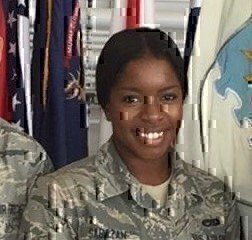 Dalia Sabazan
Dalia Sabazan
Branch of service – U.S. Air Force
Highest pay grade achieved – E-4
Military Occupation – Electronic Warfare, 2A2X3
Roles & Responsibilities of last position in the military? – Prepared aircraft for low altitude attack profiles, precision bombing, covert operations, and reconnaissance. Analyzed malfunctions, inspected, removed, maintained, and installed integrated avionics systems. Assisted in aircraft ground servicing, and launch/recovery operations. Reviewed maintenance data to determine trends and production effectiveness.
What was the biggest transition headache? – Readjusting to civilian life and establishing my own sense of structure. The military provides you with stability that I don’t think exists beyond. From the start of my day to the end I knew for the most part what my day would consist of. Of course, you can’t control everything and things may pop up, but overall we came in every day knowing how things were supposed to run and handled it accordingly. After separating I had to figure out things for myself which sounds crazy, but you really do get used to being told what to do, where to report to and how to be so it’s really difficult to break away from that routine. Thankfully the Air Force does have amazing resources that helps us get acclimated back into civilian life, so it’s not as if we’re just thrown back into society with no preparation, but there is still a sense of anxiety of the unknown.
What skills did you bring with you? – I think my ability to stay composed in even the most stressful of circumstances. From the day you step foot off that bus and start basic training up until the day you separate or retire there are so many things that are thrown at you both personal and professional, you’re definitely tested. But you keep your bearing and you don’t let it break you down in that moment. Your focus is getting the job done and making sure your fellow airmen are safe.
What made you decide on this school? – I love the fact that we are a smaller school because you really do feel a sense of community and you make genuine connections. These are people that you see every single day whether in classes, studying in the library or just in passing. St. Francis really does care about its students and it shows.
How did you research your options? – I started researching schools even before I moved back to New York just because I wanted to get an idea of my options and what would work best for me. I knew that I wanted to pursue psychology so I looked at colleges that had not only a bachelors but a masters program and of course were yellow ribbon and military friendly.
What advice would you give other transitioning veterans looking into schools? – Weigh your options and do your research months in advance to allow yourself time to decide. Don’t go for the first school that you see, take time to call and speak to a veteran representative for the school about opportunities offered and if possible visit in person to see if the vibe fits.







